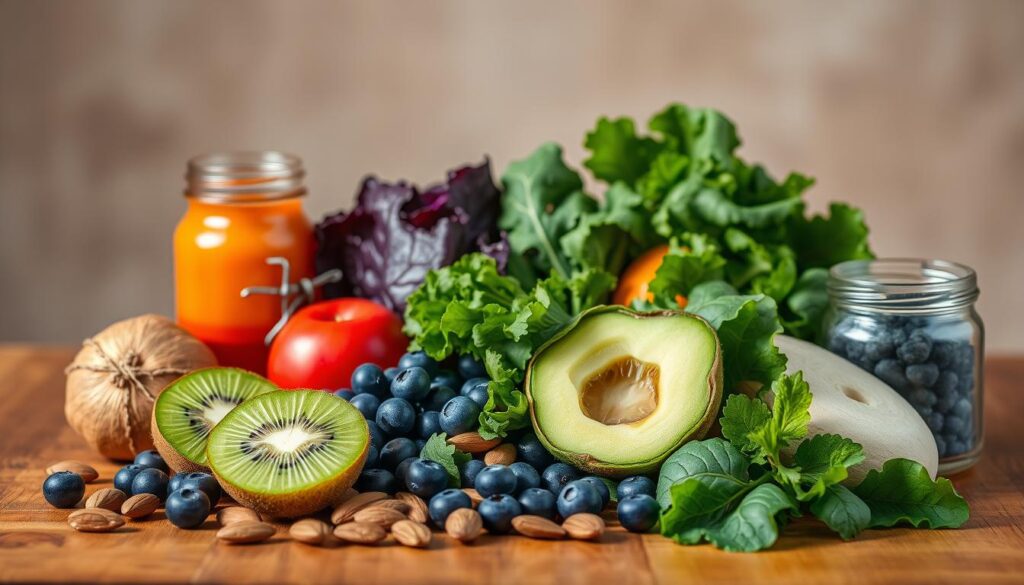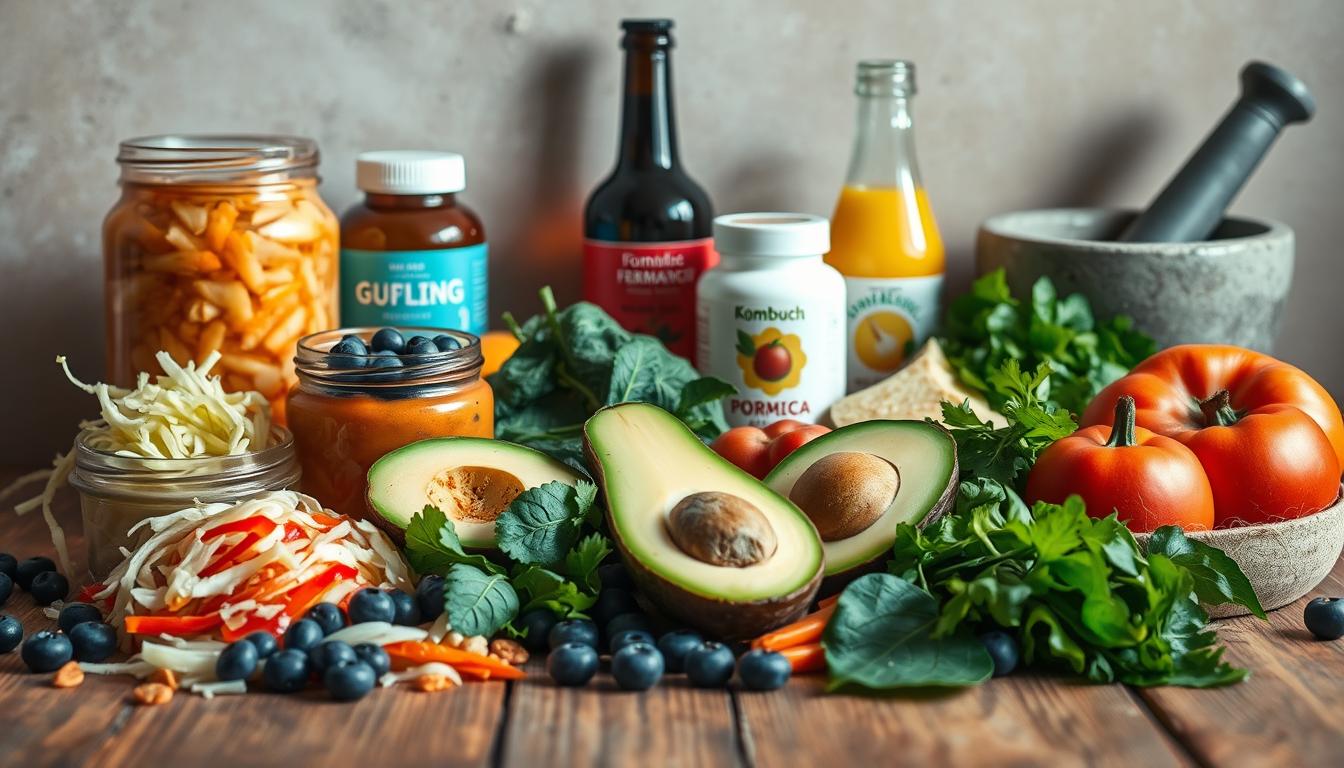The gut and brain are connected through a complex network of neurons and chemicals, influencing everything from mood to cognitive function. A staggering 90% of serotonin, a neurotransmitter crucial for mood regulation, is produced in the gut.
Incorporating specific brain health foods into your diet can significantly enhance this gut-brain connection. Certain foods rich in omega-3 fatty acids, antioxidants, and fiber can foster a healthy gut microbiome, which in turn supports brain health.
By understanding the importance of the gut-brain axis and making informed dietary choices, individuals can take a proactive approach to improving their mental clarity and overall well-being.
Key Takeaways
- Including omega-3 rich foods supports brain health.
- Antioxidant-rich foods help protect the gut.
- Fiber-rich foods promote a healthy gut microbiome.
- A healthy gut microbiome is crucial for brain function.
- Dietary choices can significantly impact mental clarity.
Understanding the Gut-Brain Connection
The gut and the brain are connected through a complex network known as the gut-brain axis, which plays a crucial role in our overall health. This connection is not just a simple link; it’s a sophisticated system that enables the exchange of information between the central nervous system (CNS) and the enteric nervous system (ENS).
What is the Gut-Brain Axis?
The gut-brain axis refers to the biochemical signaling that takes place between the gastrointestinal tract and the CNS. This complex network involves the exchange of signals between the gut microbiota, the intestinal epithelium, and the CNS, influencing various physiological processes, including digestion, immune response, and even mental health.

The Science Behind Microbiome and Mental Health
Research has shown that there is a significant link between the gut microbiome and mental health. The gut microbiota produces neurotransmitters and hormones that can influence mood, cognitive function, and behavior. For instance, serotonin, a key neurotransmitter involved in mood regulation, is primarily produced in the gut. An imbalance in the gut microbiota, also known as dysbiosis, has been linked to various mental health disorders, including anxiety and depression.
“The gut microbiota is a key player in the gut-brain axis, influencing brain function and behavior through various mechanisms, including the production of neurotransmitters and hormones.”
Signs of an Unhealthy Gut-Brain Connection
An unhealthy gut-brain connection can manifest in various ways, including digestive issues, mood disorders, and cognitive impairments. Some common signs include:
- Irritable bowel syndrome (IBS)
- Anxiety and depression
- Bloating and abdominal pain
- Fatigue and brain fog
Recognizing these signs is the first step towards taking corrective action to improve gut-brain health through dietary changes and other interventions.
Foods That Improve Gut-Brain Connection
A healthy gut-brain connection is crucial for overall well-being, and certain foods can significantly enhance this link. The gut and the brain are connected through the gut-brain axis, a bidirectional communication network that involves the nervous system, the endocrine system, and the immune system. By incorporating specific foods into your diet, you can support this complex system and promote a healthier gut-brain connection.
Fermented Foods: Yogurt, Kefir, Kimchi, and Sauerkraut
Fermented foods are rich in live cultures, or probiotics, which can help maintain a healthy gut microbiome. Yogurt and kefir are excellent sources of probiotics, with kefir having the added benefit of containing a wider variety of bacterial strains. Kimchi and sauerkraut are fermented vegetables that not only provide probiotics but are also rich in vitamins and minerals. Consuming these foods can help boost the gut-brain connection by supporting the growth of beneficial gut bacteria.
Prebiotic-Rich Foods: Garlic, Onions, and Bananas
Prebiotics are non-digestible fibers that serve as food for beneficial gut bacteria, promoting their growth and activity. Foods like garlic and onions are rich in prebiotic fibers, as are bananas, which contain inulin, a prebiotic fiber that supports the gut microbiome. By consuming prebiotic-rich foods, you can help create a favorable environment for beneficial bacteria to thrive, thereby enhancing the gut-brain connection.
Omega-3 Sources: Fatty Fish, Walnuts, and Flaxseeds
Omega-3 fatty acids are essential for brain health and have been shown to support the gut-brain axis. Fatty fish like salmon and sardines are rich in omega-3s, as are walnuts and flaxseeds. These foods help reduce inflammation in the body and support the integrity of the gut lining, contributing to a healthier gut-brain connection. Incorporating these omega-3 rich foods into your diet can be a valuable strategy for supporting both gut and brain health.
By focusing on these food groups, individuals can take a proactive approach to enhancing their gut-brain connection, potentially leading to improved mental clarity, reduced stress, and overall better health.
Fiber-Rich Foods for Optimal Gut Function
Optimal gut function is heavily reliant on a diet abundant in fiber, which helps in maintaining a healthy gut microbiome. A well-balanced gut microbiome is essential for a strong gut-brain connection, influencing both mental health and overall well-being.
Whole Grains: The Foundation of a Fiber-Rich Diet
Whole Grains: Oats, Quinoa, and Brown Rice
Whole grains are an excellent source of dietary fiber. Foods like oats, quinoa, and brown rice are not only rich in fiber but also provide essential nutrients like vitamins, minerals, and antioxidants. Incorporating these whole grains into your diet can help promote a healthy gut.
- Oats are known for their soluble fiber content, which helps in lowering cholesterol levels and regulating blood sugar.
- Quinoa is a complete protein and a good source of fiber, making it an excellent choice for those looking to boost their gut health.
- Brown rice is rich in fiber and contains less arsenic compared to white rice, making it a healthier alternative.
Fruits and Vegetables High in Soluble Fiber
Fruits and Vegetables High in Soluble Fiber
Fruits and vegetables are another crucial component of a fiber-rich diet. Soluble fiber found in these foods helps in forming a gel-like substance in the stomach, which aids in slowing down digestion and absorption of nutrients.
Some of the top fruits and vegetables high in soluble fiber include:
| Fruit/Vegetable | Soluble Fiber Content |
|---|---|
| Apples | 4.5 grams per medium-sized fruit |
| Carrots | 2.9 grams per cup |
| Oranges | 2.9 grams per medium-sized fruit |
“A high-fiber diet is associated with a lower risk of chronic diseases, including heart disease, diabetes, and certain gastrointestinal disorders.” –
How Dietary Fiber Feeds Beneficial Gut Bacteria
Dietary fiber acts as a prebiotic, feeding the beneficial bacteria in the gut, promoting their growth and activity. This process helps in maintaining a balanced gut microbiome, which is crucial for optimal gut function and overall health.
As Dr. Emeran Mayer, a renowned gastroenterologist, notes,
“The gut microbiota is a key player in the gut-brain axis, and prebiotic fiber is essential for its optimal functioning.”
By incorporating fiber-rich foods into your diet, you can support the health of your gut microbiome, ultimately enhancing your gut-brain connection.
Anti-Inflammatory Foods for Brain Health
To support brain health and reduce inflammation, it’s essential to consume foods that are known for their anti-inflammatory properties. The gut-brain connection is significantly influenced by our diet, and incorporating the right foods can lead to improved mental clarity, reduced symptoms of anxiety and depression, and overall better cognitive function.
Colorful Antioxidant-Rich Produce
Antioxidant-rich fruits and vegetables are not only colorful but also packed with nutrients that help combat inflammation. Berries, leafy greens, and cruciferous vegetables are among the top choices. These foods are rich in vitamins C and E, and other antioxidants that neutralize free radicals, thereby reducing oxidative stress and inflammation in the brain.
- Berries: Blueberries, strawberries, and raspberries are high in anthocyanins, powerful antioxidants that have been shown to improve memory and cognitive function.
- Leafy Greens: Spinach, kale, and collard greens are rich in folate, which is crucial for cognitive function and has been linked to a lower risk of depression.
- Cruciferous Vegetables: Broccoli, cauliflower, and Brussels sprouts contain sulforaphane, which has potent anti-inflammatory properties.
Healthy Fats: Olive Oil, Avocados, and Nuts
Healthy fats are essential for brain health, playing a critical role in reducing inflammation and supporting the integrity of brain cells. Olive oil is rich in oleocanthal, a compound that has been shown to have anti-inflammatory effects similar to ibuprofen. Avocados provide monounsaturated fats that support heart health and, by extension, brain health. Nuts and seeds, particularly walnuts, are rich in omega-3 fatty acids and antioxidants.
- Olive Oil: Use it as a primary cooking oil to benefit from its anti-inflammatory properties.
- Avocados: Add sliced avocados to salads or blend them into smoothies.
- Nuts and Seeds: Snack on walnuts or sprinkle chia seeds over your oatmeal.
Turmeric, Ginger, and Other Anti-Inflammatory Spices
Certain spices have been used for centuries for their medicinal properties, particularly their ability to reduce inflammation. Turmeric contains curcumin, a compound with potent anti-inflammatory and antioxidant properties. Ginger has been shown to reduce inflammation and pain. Incorporating these spices into your diet can be as simple as adding them to your meals or consuming them as teas.
- Turmeric: Add turmeric to your curries or make a turmeric latte.
- Ginger: Make ginger tea by steeping fresh ginger in hot water.
By incorporating these anti-inflammatory foods into your diet, you can support brain health and enhance the gut-brain connection. A balanced diet rich in colorful produce, healthy fats, and anti-inflammatory spices is a powerful tool in maintaining cognitive function and overall well-being.
Foods to Limit for Better Gut-Brain Health
Maintaining a healthy gut-brain connection requires a thoughtful approach to diet, involving the limitation of certain foods that can disrupt this balance. While incorporating gut-friendly foods is essential, it’s equally important to be aware of the foods that can negatively impact the gut-brain axis.
Processed Foods and Artificial Sweeteners
Processed foods often contain artificial additives, preservatives, and sweeteners that can be detrimental to gut health. Artificial sweeteners, in particular, can alter the gut microbiome by reducing beneficial bacteria. Limiting or avoiding foods with artificial ingredients can help maintain a balanced gut ecosystem.
High-Sugar Foods and Their Impact
Consuming high-sugar foods can lead to an imbalance in gut bacteria, favoring the growth of pathogenic microbes. High sugar intake is also associated with inflammation, which can negatively impact brain health. Reducing sugar consumption can help mitigate these effects and support a healthier gut-brain connection.
Alcohol and Caffeine Considerations
Both alcohol and caffeine can affect the gut-brain axis, though their impacts can vary depending on consumption levels. Excessive alcohol consumption can disrupt gut barrier function, while high caffeine intake may alter gut motility and secretion. Moderating the consumption of these substances is advisable to support gut-brain health.
By being mindful of these dietary factors and limiting or moderating the consumption of processed foods, high-sugar foods, alcohol, and caffeine, individuals can take significant steps towards supporting their gut-brain health. A balanced diet, combined with a healthy lifestyle, is key to nurturing this complex and vital connection.
Conclusion
Eating the right foods can significantly enhance your gut-brain health. By incorporating fermented foods, prebiotic-rich foods, and omega-3 sources into your diet, you can support a balanced gut microbiome and promote brain well-being.
A diet rich in fiber from whole grains, fruits, and vegetables helps feed beneficial gut bacteria, while anti-inflammatory foods like colorful produce, healthy fats, and certain spices reduce inflammation and support brain health. Limiting processed foods, high-sugar foods, and excessive alcohol and caffeine is also crucial for maintaining a healthy gut-brain axis.
By making informed dietary choices, you can take a proactive approach to supporting your gut-brain health through food. Focus on consuming top foods for gut-brain function, and you’ll be on your way to a healthier, more balanced you.
